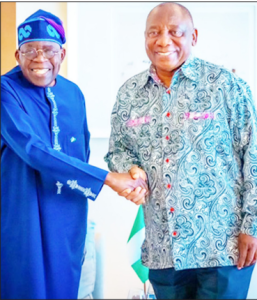
PRESIDENT Bola Tinubu was in Pretoria also known as Tshane, South Africa last Wednesday for the inauguration of the African National Congress, ANC leader, Cyril Ramaphosa who was re-elected by parliament for a second term of five years. The 30-year-old postapartheid democratic experience of South Africa has seen leadership baton move from Nelson Mandela to Thabo Mbeki, Jacob Zuma and Cyril Ramaphosa.
Nigeria and South Africa occupy leading positions with respect to economic integration, social security, diplomatic relationship regionally and across the continent. One is a leading power in ECOWAS while the other remains a regional power in the Southern African Development Commission, SADC. Whereas the structures and institutions of democracy in South Africa are gaining in credibility and functionality, the same can hardly be said of Nigeria whose political independence dates back to 64 years ago. The inauguration proper took place on Thursday, 13th June and rather interestingly, two divergently opposing reports emerged from the same ceremony. On one hand, the social media went viral on how the re-elected president Ramaphosa snubbed Nigeria’s Bola Tinubu while recognizing dignitaries including heads of States and governments who were present at the occasion. Media managers at the presidency have since described the video footage as false and intended to mislead.
They insist that Tinubu was treated with respect and that he also engaged in fruitful bilateral talks with Ramaphosa which dwelt on economic integration for a greater Africa, the need to strengthen cooperation and further deepen the economic ties between Nigeria and South Africa. Let’s for a moment consider the plausibility of the snubbing story and you will recall that worse things had happened in the diplomatic relationship between the two countries. Recall that during the State murder of Ken Sari-Wiwa, the Ogoni born environmental activist and the political imprisonment of Olusegun Obasanjo by the military junta headed by General Sani Abacha, South Africa played lead role in the Commonwealth to see to it that Nigeria was diplomatically isolated. Following however, the death of Abacha in 1998, the relationship between both countries burgeoned dramatically under Obasanjo and President Thabo Mbeki.
It can still be recalled how Nigeria from championing anti-apartheid cause at the Commonwealth, leading the economic sanctions and the sports boycotts, played very critical role in the events that culminated into South Africa’s independence from a protracted apartheid regime on April 27th 1994. Since then, the diplomatic relationship between the two countries has degenerated from what could be at best described as cordial to the present situation of cautious and complex diplomacy where Pretoria[Tshane] and Abuja will tell you that efforts are on towards economic cooperation and integration yet citizens of both countries are constantly on subdued tension bordering on crisis mode, if not outrightly under war path.
This has even been made worse by the fact of a political freedom that is taking so much time to translate into thriving economy and empowered living for citizens. From time to time, the built up anger and frustration amongst the citizenry are unleashed on other Africans in what has become known as Black on Black , Afrophobia or zenophobia. It therefore follows that however Tinubu may have been treated in South Africa could have on its own been etched in historic circumstances .
If we go In the light of Nigeria’s role in the struggle to end apartheid then Nigeria should have a pride of place in South Africa’s diplomatic considerations but so much has happened over the years including the 2005 incident when both countries were vying for the same available permanent seat on the United Nations Security Council. Nigeria, no doubt, has had the tragedy of being a poor and uninspiring example in resource management, citizenship engagement and democratic evolution.
Many African nations are openly angry and disappointed with Nigeria over the patent inability to provide leadership both within and across the continent. Come to think of it, the revered Nelson Mandela was reported to be putting up with Nnamdi Azikiwe in his Ikoyi, Lagos residence during the years of struggle against apartheid. In my undergraduate years at the University of Calabar, we had quite a number of South African students on scholarship as a result of the bilateral agreement between the African National Congress and the government of Nigeria. I later gathered that there were hundreds of such students in other universities across the country.
That educational scheme produced thousands of South Africans who studied in Nigeria and went back to occupy strategic positions in the private sector, academia and public sector of post-apartheid South Africa. Nigeria represented such a grand expectation of continental leadership as the beacon of hope for the Black race. It has however turned out that poor and perverted leadership has frustrated that dream, filtering away that groundswell of hope of sustainable development across the continent. Today, truth is that the diplomatic table of international influence has turned and the beacon of hope has turned out to be a leading source of despair. The anger against Nigeria as a nation of wasted opportunities and aborted dreams is rife and palpable across the continent. As it has to do with President Tinubu, his profile with respect to sanctity of democratic ethos and values is there in the public domain. South Africa moved and mobilized the Commonwealth against Abacha because of his poor human rights records. Tinubu’s records in Democracy is also not an impressive one.
They may have also decided to give him a place on the back row so that when he stumbles, falls and dobales to the heroes past, the scene will be a lot easier to manage. In all, it should begin to dawn on us as a nation that, our gross inability to manage our God given resources and by so doing show credible leadership across the continent has rendered our youths to the unenviable status of refugees and asylum seekers across nations of the world. No leadership can earn respect under that circumstance. Respect like recognition is earned, not forced or presumed. Nigeria has a lot of job to be done in convincing the world that the past 64 years of independent nationhood have not been years wasted in amplified and glorified self-deluding profligacy.


